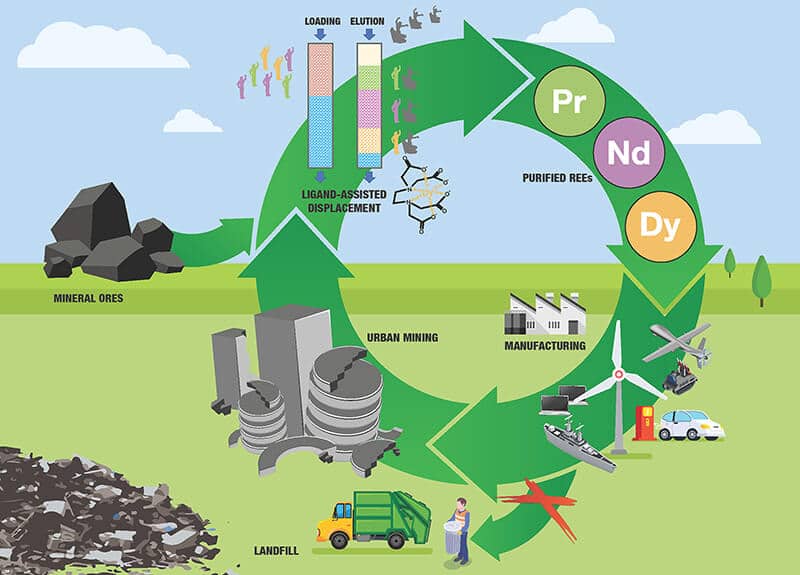US-based raw materials supplier American Resources Corporation is developing a technology to recycle rare-earth metals such as neodymium (Nd), praseodymium (Pr), and dysprosium (Dy) from lithium-ion batteries at the end of their lifecycle.
The patented technology, which the company acquired from the Purdue University in February, consists of a process to separate pure rare earth metals and critical elements from coal byproducts, recycled permanent magnets, and lithium-ion batteries used in electric vehicles or power plants based on renewable energy.
The technique is described as a two-zone ligand-assisted displacement chromatography (LAD) that is able to produce metals with high yields and purity of over 99%. Displacement chromatography is a preparative technique that is commonly used to place a sample onto the head of a column and then displace it through a solute.
The system is based on a zone-splitting method and is claimed to have an overall production capacity that can exceed 100 kg of rare earth elements per m3 per day. It requires three chromatography columns, an extractant, ethylenediaminetetraacetic acid (EDTA), and other unspecified environmentally friendly chemicals.
Compared to conventional acid-based methods, which make use of two-phase liquid–liquid extraction processes, the LAD is said to have no detrimental environmental impact. Traditional techniques, on the other hand, have also difficulties in separating rare-earth metals, due to their high similarities in chemical and physical properties, according to the researchers.
“Collectively, our process chain of technology and feedstocks enables us to help restore the domestic supply chain of these critical materials in the most sustainable and environmentally friendly and beneficial ways ever developed,” said American Resources Corporation CEO, Mark Jensen. “The team at Purdue is an important part of this, and we look forward to pushing aggressively forward with commercialization of the technology and showcasing the low cost and environmentally sensitive technology.”
In 2019, other scientists at the Purdue University developed a process to extract pure carbon from plastic waste and turn it into anode material for lithium-ion batteries.
This content is protected by copyright and may not be reused. If you want to cooperate with us and would like to reuse some of our content, please contact: editors@pv-magazine.com.




Same old dance, song and story… narrative…. values…..again …. pollute first and then “try to recycle”… mostly on paper only…..
Has society not faced this “drama” too many times already… nuclear waste, carbon pollution, now EV Batteries….. ALL PROMISE TO NEVER POLLUTE… BUT ALL FAIL MISERABLY….
If all these promises had been kept… we would NOT have Pollution would we….. so why will polluting Batteries be ANY DIFFERENT…???
Electric Battrey EV’s are NOT NEEDED as Compressed Air Vehicles (CAV) are Safe, Pollution Free and Cheap too… so just like we do not need Polluting Fuels any longer (Fossil, Nuclear) as Clean, Abundant, Sustainable Solar Panels are there (thank heavens)…. similarly, as Pollution Free CAV’s are there… why use Batteries that leave behind Toxic Waste every 3-5 years of their lives…???…. Here we go… again…!!!!